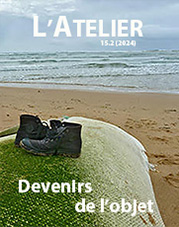For Objects’ (and My Own) Sake: Frank O’Hara’s Poetry
Abstract
In a July 1955 letter to the painter Fairfield Porter, the poet Frank O'Hara (1926-1966) expresses what he calls the “moral crisis” of writing. In that context, objects become allies: “[My work] is full of objects for their own sake, spleen and ironically intimate observation which may be truthfulness (in the lyrical sense) but is more likely to be egotistical cynicism masquerading as honesty." Frank O'Hara's Collected Poems and writings on art offer a discreet reflection on one's relationship to the material world. In this regard, the phrase "objects for their own sake" is fertile: O'Hara's reinvention of the lyrical subject can be understood as a variation on the word "sake." If we define the phrase as "objects for their own sake," then we understand the poet's materialism as a desire to account for objective reality without projecting feelings onto it or making it a mere vector of subjectivity. Even if, for O'Hara, the most beautiful objects are those that resist people's will to project their feelings onto them, they are by no means freed from the grip of subjectivity: they are also "for my sake.” This article explores Frank O'Hara's early "materialist lyricism" in the poems of the mid-fifties, which saw the elaboration of a "new interior" populated by objects in preparation for the "I do this I do that" poems of the New York walker.
Keywords : Frank O’Hara (1926-1966), poetry, US poetry, lyricism, materialism, subject, object
Downloads
Published
Issue
Section
License
- Work submitted for publication must be original, previously unpublished, and not under consideration for publication elsewhere. If previously published figures, tables, or parts of text are to be included, the copyright-holder's permission must have been obtained prior to submission.
- Authors of accepted manuscripts will assign to L'Atelier the right to electronically distribute their article, or publish it in any form (Internet, CD ROM, printed copy) but authors will retain copyright and, after the article has appeared in L'Atelier, authors may republish their text (in print and/or electronic form) as long as they clearly acknowledge L'Atelier as the original publisher.


